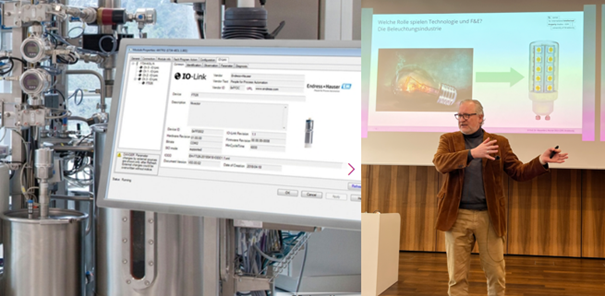The Role of IP in Digital Transformation and Industry 4.0: Technology Day 2024 at Endress & Hauser
Endress & Hauser is a global leader in instrumentation, i.e. indicating, measuring and recording physical quantities and process automation. Instrumentation plays a crucial role in Industry 4.0 as it enables the data collection and analysis needed to automate and optimize production processes. Endress & Hauser is a Swiss company with a turnover of almost 3 billion euros and nearly 16,000 employees.
In Industry 4.0, people, machines, products and complete systems communicate with each other and work together. Instruments collect data from these interactions, which can then be analyzed and used to optimize processes and increase efficiency.
For example, condition monitoring and predictive maintenance can reduce downtime and increase productivity. In addition, by using tools and analyzing the data collected, product defects can be reduced and false positives minimized.
In Industry 4.0, instrumentation is not limited to individual devices or processes. Instead, it aims to optimize entire value chains. This means that all phases of a product’s life cycle can be tracked and mapped. Instrumentation is crucial in realizing the benefits of Industry 4.0 by providing the necessary data for the automation, connectivity and optimization of industrial processes.
Feedback by Dr. Christine Koslowski, Director IPR at Endress+Hauser Group, after the training: „Prof. Wurzer stands out as a strategic mind in the field of intellectual property management. He is an eloquent, sharp-minded, and engaging speaker, whose thoughts and insights on the role of IP in the digital transformation are highly relevant.“
The Technology Day 2024 on January 26 was organized by PatServ of the IP department of Endress+Hauser under the direction of Dr. Christine Koslowski Director IPR at Endress+Hauser Group and Prof. Dr. Alexander Wurzer gave the keynote speech on the role of IP in digital transformation in Basel. The lecture and the subsequent panel discussion dealt with the following points:
- The number of so-called digital patents, which protect digital use cases, business models, apps, customer journeys and their technical implementation, among other things, is increasing dramatically in Europe, as in the other major economic regions.
- It’s no longer a question of “if” AI is creative, problem-solving, and inventive – it can only be about how to use AI for IP portfolio management, including building, researching, filing, infringement identification, and enforcement efficiently and effectively.
- The complexity of technology, business models and use cases is becoming ever greater. At the same time, business is being done less and less in simple transactions and more and more complex relationships in business ecosystems. This complexity, including the enormous degrees of freedom that digital solutions entail, requires a value-driven patent approach, not an invention-driven one. This is all the more true for all other forms of intellectual property as well as varieties of intangible assets.
- This development can be seen in many examples, such as Sonos, Spotify, Siemens and Philipps Signify.
- The lighting industry in particular is a good example to understand how an entire industry has to reinvent itself due to technological change. Moving away from the focus on the production of tangible assets to the business development of user-centered use cases.
- The skill required for this is IP design, i.e. the application of standard-compliant IP management and the PDCA cycle described therein: Plan, Do, Check and Act. The main aim is to identify the need for IP for a business model and then to meet it in a targeted manner. The consistent implementation of this approach often requires a change process in the company, as IP must be integrated very early in the considerations of new products and services.
Here are the slides of this keynote:




